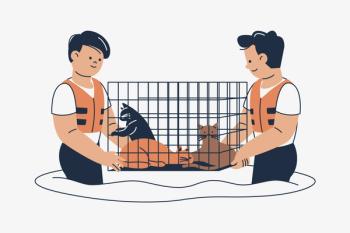
In the public eye
Baltimore - Veterinarians need to engage the public in dialogue about animal-welfare issues.
BALTIMORE — Veterinarians need to engage the public in dialogue about animal-welfare issues.
That was one message from Dr. Tom Lenz, who delivered the keynote address at the American Association of Equine Practitioners (AAEP) meeting last month. Veterinary medicine is the most credible profession to establish sound welfare principles, but veterinarians haven't yet entered the public discourse in meaningful ways, Lenz contends.
"We have engaged industry, government and even activists, but we haven't truly engaged the public in this dialogue," Lenz says.
And while veterinary medicine is actively addressing the physiological needs of animals, the public is making its decision often on the psychological well-being of these animals.
While he is quick to recognize the inroads AAEP officials have made on equine-welfare issues like race-day medications, breakdowns, soring, unwanted horses and even welfare concerns for carriage horses, he believes the profession can step up its leadership role in helping policy makers balance the physiological and psychological aspects to animal welfare.
"I think, as a profession, we have to understand that science informs, but people make decisions. There is a social component to animal abuse and animal care that we need to recognize. We should also recognize that frequently emotion and misinformation triumphs over science and fact just because of the way it is presented."
Lenz knows. In fact, over a 30-year career as an equine veterinarian, he has emerged as a prominent voice regarding equine welfare issues. He chairs the American Horse Council's Unwanted Horse Coalition; he's past president of AAEP, serves on the AAEP's Animal Welfare Committee and remains a member of the AAEP President's Advisory Board and Public Policy Committee. His career has spanned from private equine practice to academia to corporate business.
What makes welfare issues even more convoluted is the divergent opinions that exist about what is appropriate care.
"Our views on welfare are based on our life experiences, whether it was on a farm or a ranch or a town or what part of the country you come from. Based on those life experiences we have totally different perceptions of what good animal welfare is," he explains.
"We have a public that is two to three generations off of the family farm. Most people don't know how animals are raised. Yet, the public is very interested in animals."
Take horses for example. They are iconic figures in our culture—from racing to classic Western films, he says. "The American public loves horses even if they have never touched a horse. Because of that, the public has very strong opinions on how they should be treated, even though they don't really understand good horse care."
And the debate even extends inside the veterinary community.
"My wife is a veterinarian. I was raised on a farm in Missouri, and she was raised in a medium-sized town in Oklahoma," Lenz says. "Our horses spent their lives in the pasture, and her horses spent their lives stalled. Some of our views on welfare are totally different. She thinks horses need to be in the stall every night, and I think they would be just fine out in the pasture. My point is that even in our profession we are going to have a lot of divergent opinions."
At the same time, this country is wrestling with a severe unwanted horse problem-another issue Lenz has been close too.
Currently, there are an estimated 100,000 unwanted horses in the United States. According to a recent survey from the University of California-Davis, there are some 326 registered non-profit equine rescue facilities in the United States. The maximum capacity is about 13,400 for each facility, which is well below the numbers of unwanted horses.
The Unwanted Horse Coalition contends the current facilities need more funding and there needs to be more rescue/adoption/rehabilitation facilities created to manage the numbers.
"Members of the general public are not sitting at the meetings, but they are reacting to what they hear, which is often wrong. My advise is that we need to look at these welfare issues as an opportunity to interact and find common ground. To accomplish it, we are going to have to communicate with lots of different people," he adds.
"I think the average American is probably a moderate animal-rights person. They want to do the right thing, but they don't know exactly what that means. If we don't start communicating with these people and start talking about the issues, we are going to loose our place at the table." More importantly, Lenz says that veterinarians are by far the most qualified to add a credible voice to these issues.
Newsletter
From exam room tips to practice management insights, get trusted veterinary news delivered straight to your inbox—subscribe to dvm360.




